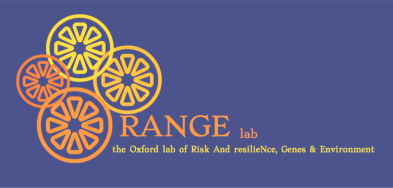Professor Lucy Bowes
|
Professor Lucy Bowes is a Professor in the Department of Experimental Psychology and the Principal Investigator of the oRANGE Lab. Lucy graduated with a BA Hons in Experimental Psychology from Oxford University in 2004. She was awarded a PhD in Behavioural Genetics in 2011 from the Institute of Psychiatry, King’s College London. Lucy is a Leverhulme Early Career Research Fellow at the Department of Experimental Psychology, and was appointed as a Fellow of Magdalen College in 2014. She tutors in prelims Psychology and Part 1 Individual Differences and Psychological Disorders. Lucy has received awards from the Medical Research Council and the Economic and Social Research Council, UK. Her research on school bullying has been supported by the Jacobs Foundation, and her current work on resilience to harsh, non-supportive parenting is supported by a Leverhulme Early Career Fellowship.
Lucy’s research focuses on the impact of early life stress on psychological and behavioural development. In particular, Lucy has focused on the effects of victimization on young people’s adjustment and wellbeing. Her research integrates methods from social epidemiology, developmental psychology and behavioural genetics in order to understand the complex genetic and environmental influences that promote resilience to victimization and early life stress. The aim of her work is to guide intervention work by identifying protective factors that promote positive outcomes among vulnerable children. Email: lucy.bowes@psy.ox.ac.uk |
Dr. Julia Badger
Dr. Sînziana Oncioiu
|
Dr. Sînziana I. Oncioiu is a UKRI Horizon Europe Guarantee MSCA Postdoctoral Fellow at the Department of Experimental Psychology. Her work in the oRANGE lab focuses on understanding the links between developmental language disorders, bullying and mental health among children and young people. She is using genetically informative designs and statistical methods to strengthen causal inference and trajectory modelling to capture stability and change in psychopathology over development.
Sînziana obtained a Pharmacist degree from ‘Carol Davila’ University in Romania and a Master of Science in Public Health Epidemiology from Karolinska Institute in Sweden. She joined the University of Oxford in December 2020 as a Calleva Centre Postdoctoral Research Associate at Magdalen College. Sînziana was awarded a PhD in Public Health Epidemiology from the University of Bordeaux in France in 2020. Previously she worked as a trainee for the European Commission and the European Society for Prevention Research on projects related to the prevention of substance use at European level. Sînziana has a strong interest in child and adolescent social relationships and their impact on mental health, developmental psychology, life course epidemiology, causal inference, intervention research, and the uptake of scientific evidence into policymaking. E-mail: sinziana-ioana.oncioiu[at]psy.ox.ac.uk Researchgate.net Google Scholar |
Dr. Jack Andrews
|
Dr Jack Andrews is a Wellcome Trust Early-Career Fellow in the Department of Experimental Psychology. Jack is a developmental psychologist, interested in how adolescents navigate their complex social networks, and how these networks impact mental health. His current programme of work is focused on the role of peer influence effects on adolescent mental health (e.g., social contagion and co-rumination), the application of novel methods to evaluate the success and failure of school-based interventions (e.g., using social network analysis) and on the development of social-cognition during adolescence (e.g., social working memory).
Jack’s research is currently funded by the Wellcome Trust and University College, Oxford, where he holds the Stevenson JRF in Medical Sciences (Psychology). He is also an affiliated Research Fellow at the Matilda Centre for Mental Health and Substance Use at the University of Sydney. Prior to joining Oxford, Jack graduated with a BA (Hons) from Cambridge, and a PhD in Cognitive Neuroscience from UCL, followed by two years as a Postdoc at the University of New South Wales, and the University of Sydney, Australia. Email: jack.andrews@univ.ox.ac.uk | Twitter | Google Scholar |
Carolina Guzman Holst
|
Carolina Guzman Holst is a DPhil student in the Department of Experimental Psychology at Oxford University. Her doctoral work focuses on building a contemporary model of risk and resilience for adolescent peer victimisation using longitudinal analysis and experimental design. Specifically, she is interested in understanding how social, emotional and cognitive mechanisms interact with key biological systems to predict functioning in adolescents with a history of childhood bullying. To this end, she is using virtual reality to identify specific risk and protective pathways between bullying and psychological outcomes such as depression and anxiety. Her goal is to establish mechanisms that can be used to promote resilient outcomes across the life course and inform interventions for vulnerable adolescents.
Carolina graduated with a Bachelor of Science from Brown University and a Master of Science in Psychological Research from Oxford University. Her current DPhil work forms part of the “Changing Lives” project funded by the Calleva Foundation, which seeks to understand the life-long impact of early-life adversity and identify risk and protective factors that contribute to resilience across the life-course. Email: carolina.guzmanholst@magd.ox.ac.uk |
Athena Chow
|
Athena Chow is a DPhil student in the Department of Experimental Psychology at Oxford University. Her doctoral work focuses on using data from longitudinal birth cohort studies to conceptualise adverse childhood experiences (ACEs) as dimensions of threat and deprivation. Her current DPhil work forms part of the “Moving Beyond Inequality” programme funded by the Leverhulme Trust, which aims to reduce social inequalities by addressing the biological embedding of social adversity during the early years. Athena graduated with a Bachelor of Science in Psychology from University College London (UCL) and then continued researching the early risk factors for joint trajectories of bullying victimisation and perpetration in the UCL C-MAP Lab. Her interests include developmental psychopathology, longitudinal research methods, and life course epidemiology. Email: athena.chow@magd.ox.ac.uk |
Elise Sellars
|
Elise is a DPhil student in the Department of Experimental Psychology at the University of Oxford, funded by the ESRC Grand Union Doctoral Training Programme. Elise’s DPhil work focuses on understanding conflict in children's interpersonal relationships. This involves the analysis of large scale datasets of randomised controlled trials of parenting programs for children's conduct problems, to explore whether these programs reduce children's violence towards other children.
Elise holds a BA Hons in Experimental Psychology and MSc in Psychological Research from the University of Oxford. Prior to joining the lab, Elise worked as a research assistant in the Child and Adolescent Psychiatry group at the University of Oxford. Email: elise.sellars@psy.ox.ac.uk |
Dr. Chloe Bracegirdle |
Dr Chloe Bracegirdle is a British Academy Postdoctoral Fellow at the University of Oxford. Her main research interests include intergroup contact, integration, prejudice, discrimination and socialization. She uses large-scale longitudinal social network studies to investigate the impacts of contact between different ethnic and religious groups. Her current research examines how school social networks shape prejudice, discrimination and mental wellbeing among adolescents. Chloe received her DPhil in Psychology from the University of Oxford in 2020. She was awarded a MSc in Psychological Research from the University of Oxford in 2016 and a BSc Hons in Psychology and Language Sciences from University College London (UCL) in 2015. Email: chloe.bracegirdle@nuffield.ox.ac.uk |
Dr. Mary Kempnich
|
Dr Mary Kempnich is interested in how a period of transition affects our relationships and mental health. The importance of maintaining supporting relationships for our health, well-being, and performance can hardly be overstated. Social support is especially needed during potentially stressful times of change. Yet, the relationships offering such support might themselves appear especially fragile during such periods, and contribute to experiences of heightened levels of anxiety, depression, or loneliness – the pandemic serves as an excellent example.
Using prospective, longitudinal designs and combining personal and cohort social network analyses, her work aims to provide a better understanding of what factors predict how such a transition is experienced by whom. Her research integrates theories from social, evolutionary, and clinical psychology to gain a more comprehensive understanding of how changes in our (social) world affect us. She has moreover become interested in better understanding how mindfulness can combat and prevent such heightened levels of anxiety, depression, and loneliness, and how a regular practice can also further the lives of those already doing well and choosing to connect with themselves in a curious, non-judgemental, and compassionate manner. Ultimately, she hopes to contribute to a shift in how we approach demanding periods of change, so that we can better navigate the challenges such times bring, and experience these as enriching and even enjoyable endeavours. In addition, she has developed a deep appreciation for how our relationship to others, to our work and our skills, and, perhaps most importantly, to ourselves largely shapes how healthy, happy, and long a life we lead. This appreciation prompted her to expand her research interests to also include mindfulness, to become a mindset mentor for high achievers, and to always teach, coach, and lead with the aim of positively impacting both a person's academic or professional skill sets as well as their personal development and well-being. If we are committing to continuously excelling across a lifetime – why not make it a worthwhile and even blissful experience? |
Olivia Cheriton
|
Olivia is a DPhil student in the Department of Experimental Psychology at the University of Oxford. Her doctoral work focuses on the bullying experiences of children and young people with autism. She will investigate the likelihood of children and young people with autism being either the victim or perpetrator of bullying behaviour, and the risk and protective factors associated with these outcomes.
Olivia graduated from the University of Oxford with a BA(Hons) in Experimental Psychology and an MSc in War and Psychiatry from King’s College, London. She also holds a PGCE in Secondary Education, and currently combines working on her DPhil with teaching A level Psychology at a girls’ school in Twickenham. Email: olivia.cheriton@psy.ox.ac.uk |










